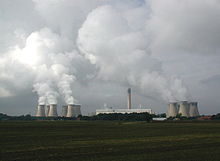
The government has confirmed that unabated coal-fired power stations will face restricted use from 2023 and total closure from 2025.
The department of energy and climate change announced the move in a pre-market statement ahead of a broader policy ‘reset’ to be given by energy secretary Amber Rudd at 10.30am.
Rudd is expected to give a clearer indication of the conservative government’s thinking on energy policy.
The Tories have made little secret of energy priorities, with security of supply and affordability appearing to trump decarbonisation within the so called energy trilemma. Since May, the government has made steep subsidy cuts for renewables, created new powers for shale gas planning and is ploughing on with nuclear power deals with the French and Chinese set in motion by the previous coalition government.
The announcement on coal was expected given the EU Industrial Emissions Directive (IED), but it may have immediate implications for current policy levers and investment.
Most UK coal plants are expected to come off the system well before 2023. The IED limits emissions and particulates. Plant operators have had to choose between cleaning up their power stations – which is expensive – or opting out and closing by 2023 at the latest. Other derogations include a national transitional plan, which gives member states four years to implement the directive, an option taken up by some coal plant operators.
However, there may be questions for government to answer over coal operators with longer capacity market contracts. By stating that unabated coal will be phased out entirely by 2025, it could mean that some firms see investment in abatement for just two years operating extension as uneconomic. That may in turn create a stronger investment signal for new gas plant in the medium term, according to analysts.
The markets should give an indication of whether the pre-announcement negatively impacts those coal operators, of which Drax investors may be watching most carefully.
The value of the UK’s biggest coal plant operator has dropped by around two thirds in the last 18 months. Enjoying a five year high at the beginning of 2014, the company saw its value fall steeply around the the first capacity auction last December, and again in July, when George Osborne announced changes to the Climate Change Levy.
Related articles:
UK to lose another 2GW of power as Eggborough set for colosure
Drax to halt CCS investment, seeks more biomass support
Free report: How businesses think demand side response must change
Free report: Financing Energy Efficiency – why are projects failing for lack of finance?
Click here to see if you qualify for a free subscription to the print magazine, or to renew.
Follow us @EnergystMedia. For regular updates, sign up for the free newsletter.



